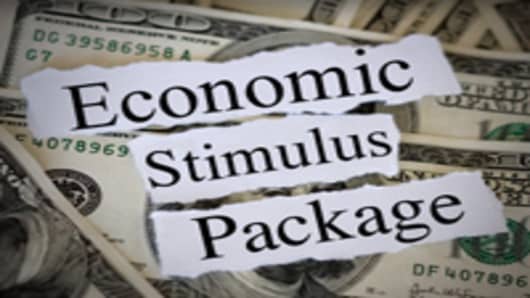Late yesterday, the US House and Senate conferees came to an agreement on the Obama stimulus plan.
Shockingly, they heard the cries from the financial markets and adjusted the package. They reduced the overall amount to below $800 billion, supposedly bumped up the number of jobs the plan will create, and cut back on some of the pork.
A 15k tax credit for anybody buying a home over the next year was dropped, $500-per-worker credit for lower & middle-income taxpayers was cut to $400, and a $54 billion award to money-losing businesses over the next two years was cut to just small businesses. However, a $70 billion alternative minimum tax hole was filled and helps keep new taxpayers from creeping towards higher taxes.
The decision to cut back the spending was a great idea.
Many economists who had originally supported a stimulus plan (Marty Feldstein) had recanted due to the size of the project and the pork. Still, the fact this has passed appears to vindicate economists like Joseph Stiglitz and Paul Krugman who have advocated large, Keynesian spending to help lift the economy out of it's depths.
Interestingly, both Krugman and Stiglitz were highly critical of the IMF during the Asian crisis for attaching tough conditions on to the loans they made. The high interest rates and smaller government deficits were seen as inhibiting the recovery versus Keynesian theories of letting currencies depreciate and having government deficits rise.
In 2002, Kenneth Rogoff had these words for such thinking:
"Governments typically come to the IMF for financial assistance when they are having trouble finding buyers for their debt and when the value of their money is falling. The Stiglitzian prescription is to raise the profile of fiscal deficits, that is, to issue more debt and to print more money. You seem to believe that if a distressed government issues more currency, its citizens will suddenly think it more valuable. You seem to believe that when investors are no longer willing to hold a government’s debt, all that needs to be done is to increase the supply and it will sell like hot cakes. We at the IMF—no, make that we on the Planet Earth—have considerable experience suggesting otherwise. We earthlings have found that when a country in fiscal distress tries to escape by printing more money, inflation rises, often uncontrollably. Uncontrolled inflation strangles growth, hurting the entire populace but, especially the indigent. The laws of economics may be different in your part of the gamma quadrant, but around here we find that when an almost bankrupt government fails to credibly constrain the time profile of its fiscal deficits, things generally get worse instead of better."
- Obama Nears Victory on Stimulus Plan
- Pros Say: Stimulus Plan is 20% Baggage
This is potentially where the US and the UK are headed unless they let their currencies depreciate and reduce their looming fiscal deficits by raising taxes or cutting spending.
Let's use Occam's Razor theory on the potential outcomes: higher taxes and weaker currency is where they are headed. The UK is already allowing the currency to depreciate and PM Brown's comments today (we're not targeting the pound) support this policy direction. Granted, the rest of the world is a mess as well.
However, the Bush tax cuts will be allowed to sunset and the US dollar will be allowed to depreciate under this scenario.
________________________
Andrew Busch



